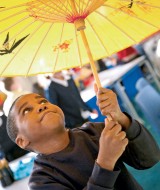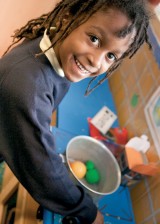With its relentless focus on pupils’ progress, staff at Chingford Hall Primary are transforming the prospects of children in Waltham Forest
Are some ‘outstandings’ worth more than others? Should a school in an affluent, middle class suburb with a ‘1’ in every box receive the same plaudits as one managing the same feat in an area of high deprivation and historically low attainment? It’s not as simple as that, of course, though few would deny that those institutions who overcome significant challenges deserve to be feted as examples of education really making a difference. But perhaps the more valid question to ask is, ‘On what should schools be judged?’, given that their starting points differ so widely.
Last year, Lord Bew’s report into KS2 testing, assessment and accountability, backed by Education Secretary, Michael Gove, called for greater emphasis to be placed on the progress made by students when schools were scrutinised by Government, local authorities or Ofsted – a recognition of the fact that the playing field is not an even one, and that the improvements students make are as important as their attainment when the efficacy of their teachers is being considered.
 By any measure, Chingford Hall Primary in the London Borough of Waltham Forest is ‘outstanding’, but it is arguably the progress its students make which best defines its staff’s success. Residing in the top percentile of most improved primaries in England, the sheer scale of the transformation wrought on the school’s intake – and the metronomic regularity with which it is achieved – last year earned its head, Patricia Davies, a Teaching Award for ‘Headteacher of the Year’. And all this just four years after she arrived as substantive head in 2007, taking on a school which had long struggled to cope with the demands placed upon it.
By any measure, Chingford Hall Primary in the London Borough of Waltham Forest is ‘outstanding’, but it is arguably the progress its students make which best defines its staff’s success. Residing in the top percentile of most improved primaries in England, the sheer scale of the transformation wrought on the school’s intake – and the metronomic regularity with which it is achieved – last year earned its head, Patricia Davies, a Teaching Award for ‘Headteacher of the Year’. And all this just four years after she arrived as substantive head in 2007, taking on a school which had long struggled to cope with the demands placed upon it.
“This is a school in an area of high deprivation,” Patricia explains. “When I first arrived, I’d attend headteachers meetings, tell people where I’d come from and hear ‘Ooh, OK…’ in response. Really, Chingford Hall had been written off. Nobody wanted to send their children here.”
Having worked prior to her arrival as an associate head supporting other struggling schools, Patricia was certainly under no illusions about the scale of the task facing her – “I had a few interviews before I took up the post here, but this was my favourite as it was the most challenging. It’s nice to get your teeth into something where you know you can make a difference!” – but asked about how she approached turning an underachieving primary into one forging a path for others to follow, she admits there’s no magic bullet: “There isn’t necessarily a blueprint for a successful school,” she says. “You have to have systems and policies in place so that children are safeguarded and there is consistency in standards across the school, and that can be blueprinted. But it’s also important that all stakeholders have a vision of where you’re going, and can understand the rationale behind it.”
 The vision at Chingford Hall is shaped by its intake, which comprises higher than average numbers of children with special educational needs, disabilities and English as an additional language. The high mobility of families in the area, and problems with poor attendance, had only compounded these problems. Patricia’s response has been a relentless process of engagement: “When I first came here people thought we wouldn’t get certain parents in,” she explains, “or that we might as well give up on some children because their parents aren’t interested. But I’ve never met a parent who’s not interested in their child. Education might not be their number one priority, but if you keep chipping away all of a sudden you’ll find a little way in, and when you do, you grab it with both hands. That’s what works here – when we get new families in we nag the life out of them, and we never write anyone off, ever.”
The vision at Chingford Hall is shaped by its intake, which comprises higher than average numbers of children with special educational needs, disabilities and English as an additional language. The high mobility of families in the area, and problems with poor attendance, had only compounded these problems. Patricia’s response has been a relentless process of engagement: “When I first came here people thought we wouldn’t get certain parents in,” she explains, “or that we might as well give up on some children because their parents aren’t interested. But I’ve never met a parent who’s not interested in their child. Education might not be their number one priority, but if you keep chipping away all of a sudden you’ll find a little way in, and when you do, you grab it with both hands. That’s what works here – when we get new families in we nag the life out of them, and we never write anyone off, ever.”
This engagement extends into the classroom. Staff reach out to children through a flexible curriculum focusing on the key skills they need to improve and delivered with the creativity essential to motivate and enthuse. “In the beginning we didn’t follow the curriculum as we should,” Patricia admits. “We wanted to concentrate on doing fewer things better. Because so many children come in way below average standards we focus a lot on English and maths. But it’s got to be done in an enjoyable way – you’ve got to get kids hooked. It’s about pitching it correctly, as soon as we have them at the school. I’ve known children who might do anything they can to get out of maths, but if you give them a project where they’re making something, perhaps a ship, they’ll happily estimate, measure and weigh. It’s about finding out what interests children.”
 Within this focus, it’s clear that Patricia has introduced a particular emphasis on developing her student’s reading skills. “Reading is the most fundamental skill,” she says. “If you can’t read, then it affects other areas. Our children’s skills are way below average when they arrive, so helping them to progress is about assessing what they need to improve and allowing them to feel that they’re doing well. If we think they need a particular intervention we put it into place as quickly as possible and monitor the impact. For example, we might use Every Child a Reader – but if it doesn’t work, and it doesn’t for every single child, we’ll try something different. You need to make sure that every single day that child has an opportunity to practice – we make sure it’s done, there’s no question of not having time.” Ensuring that progress is maintained is about more than the content of your curriculum and a focus on the fundamentals; productive assessment is vital, and at Chingford Hall it’s put into practice by staff and children alike. “Years ago when I was doing my NPQH,” Patricia explains, “I became interested in getting children involved in their own assessment. I did a project on peer assessment and went to observe different classes and teachers at the time. I found that pupils would take their work to one of the children who was seen as clever, and they would say ‘well done’ or ‘good work’, and this very much reflected the way in which the teachers were marking children’s work. One of the things I’ve done is to first of all develop teachers skills on how to mark for next steps, which then allows them to give children an understanding of what it is they’re measuring their success against. It’s not something they do every day, to prevent it getting in the way of having a dialogue with the teacher. But when it does, it’s all wrapped up in the lesson, so they understand the learning objective and what needs to be done.
Within this focus, it’s clear that Patricia has introduced a particular emphasis on developing her student’s reading skills. “Reading is the most fundamental skill,” she says. “If you can’t read, then it affects other areas. Our children’s skills are way below average when they arrive, so helping them to progress is about assessing what they need to improve and allowing them to feel that they’re doing well. If we think they need a particular intervention we put it into place as quickly as possible and monitor the impact. For example, we might use Every Child a Reader – but if it doesn’t work, and it doesn’t for every single child, we’ll try something different. You need to make sure that every single day that child has an opportunity to practice – we make sure it’s done, there’s no question of not having time.” Ensuring that progress is maintained is about more than the content of your curriculum and a focus on the fundamentals; productive assessment is vital, and at Chingford Hall it’s put into practice by staff and children alike. “Years ago when I was doing my NPQH,” Patricia explains, “I became interested in getting children involved in their own assessment. I did a project on peer assessment and went to observe different classes and teachers at the time. I found that pupils would take their work to one of the children who was seen as clever, and they would say ‘well done’ or ‘good work’, and this very much reflected the way in which the teachers were marking children’s work. One of the things I’ve done is to first of all develop teachers skills on how to mark for next steps, which then allows them to give children an understanding of what it is they’re measuring their success against. It’s not something they do every day, to prevent it getting in the way of having a dialogue with the teacher. But when it does, it’s all wrapped up in the lesson, so they understand the learning objective and what needs to be done.
“If children are making progress then it’s usually a result of good assessment,” she concludes. “It mustn’t be separate from teaching, it’s part of it – it’s about asking questions, challenging the children, getting them involved in their learning and moving them on to the next stage.”
Regardless of how sound and clearly communicated a vision is, putting it into action is easier said than done. With Patricia spending three days a week in her role as executive head of nearby Whittingham Community Primary, much of the responsibility for the day-today running and continuing improvement of Chingford Hall has fallen to deputy head Mary Vicentuan and the senior leadership team. Their continuing success is testament to both shrewd recruitment and an emphasis on continuing professional development that ensures no one is resting on their laurels.
“It is challenging leading more than one school,” says Patricia, “but Chingford Hall is now sustainable. All the systems are in place and the SLT and I work really well together. I’m quite choosy about my staff, but I try to look at the attitude, not just the skills – you can teach those to an extent, but if someone hasn’t got the motivation it’s not going to work.
“CPD is also crucial,” she continues. “New staff do not always come in as fantastic teachers, and it’s important to help develop their belief in themselves, to encourage them to take risks. They need to be led and they need to be managed. I’ve worked with teachers at other schools who have been inadequate but have become consistently good – a lot of the time, if you put the right support in place you can develop and improve those who are struggling. Here, I’m lucky,” she adds. “All the staff just give and give and give, and I’m the one who’s generally jangling the keys and throwing them out at the end of the night!”
Chingford Hall’s journey from struggling school to success story might be, in many respects, complete, but it is one now being echoed by those of its pupils, year after year; in Patricia’s view it is not the eventual destination that is most important but the fact that they’re moving: “We have some child en who have really complex needs and it’s not necessarily important that they achieve a high level, but it is vital that they make good progress,” she says. “Not all children can leave primary school with a Level 4 or 5 or higher; we had a child who joined us in Y5 and he wasn’t even a Level 1. He left us at a Level 3. His self-esteem improved, he was more independent – that’s far more important than the grading.”
 In addition to Chingford Hall’s early years provision, it also operates a children’s centre. Introduced 18 months after Patricia’s arrival, it plays an important role in staff’s efforts to engage with the families in their catchment area. “We have an outreach team at the centre that goes out into people’s houses to offer support,” explains EYFS coordinator, Karen Wishart. “Our mobile toy library is very useful for connecting with hard to reach parents, and we’ve just introduced a literacy champions programme – as part of which, someone has been trained up to go out and support families in the community.
In addition to Chingford Hall’s early years provision, it also operates a children’s centre. Introduced 18 months after Patricia’s arrival, it plays an important role in staff’s efforts to engage with the families in their catchment area. “We have an outreach team at the centre that goes out into people’s houses to offer support,” explains EYFS coordinator, Karen Wishart. “Our mobile toy library is very useful for connecting with hard to reach parents, and we’ve just introduced a literacy champions programme – as part of which, someone has been trained up to go out and support families in the community.
“When the centre first opened up,” she reflects, “we were offering drop-in play and learn events, but soon realised that it was the same people always coming back, usually those people who were more confident. So it was a case of working out how we could best meet new families, and going out into the community has proved a great success.”
 “We’re very fortunate to have the staff that we have,” says deputy head, Mary Vicentuan. “There’s a sense of community here, and everyone who has been on the journey has worked hard to get to where we’re at now. It’s nice to know that things like higher order questioning, ensuring lessons are interactive and making sure classroom displays are vibrant are a given as far as our teachers are concerned.
“We’re very fortunate to have the staff that we have,” says deputy head, Mary Vicentuan. “There’s a sense of community here, and everyone who has been on the journey has worked hard to get to where we’re at now. It’s nice to know that things like higher order questioning, ensuring lessons are interactive and making sure classroom displays are vibrant are a given as far as our teachers are concerned.
“I think when we recruit we make our expectations very explicit,” she continues. “And when you see someone going the extra mile, working extra hours or staying behind of an evening, it rubs off on people. They do it notbecause someone’s threatening them with a stick but because they want to do it for the children. Staff want to be developed here, too” she adds. “They’ll come to us if they’re struggling with something, and they know we take their comments on board. There’s an atmosphere of mutual respect.”
 Despite the challenges faced by children at Chingford Hall, the school’s most recent Ofsted report highlights their exemplary behaviour. “Children don’t always share our philosophy when they first join the school,” says Patricia, “but they quickly come on board. Our behaviour policy is very clear; children know what the rewards are and what the consequences are if they don’t meet expectations. Every child starts on green and if they get a warning they put themselves onto blue. If they reach yellow they lose a playtime. They seldom get to yellow more than three times in a month. If it’s three times in the week, then we call the parents in, but that’s very rare. It’s about instilling respect in the children, modelling how they should speak to and deal with one another. We’re not perfect, but the system works.”
Despite the challenges faced by children at Chingford Hall, the school’s most recent Ofsted report highlights their exemplary behaviour. “Children don’t always share our philosophy when they first join the school,” says Patricia, “but they quickly come on board. Our behaviour policy is very clear; children know what the rewards are and what the consequences are if they don’t meet expectations. Every child starts on green and if they get a warning they put themselves onto blue. If they reach yellow they lose a playtime. They seldom get to yellow more than three times in a month. If it’s three times in the week, then we call the parents in, but that’s very rare. It’s about instilling respect in the children, modelling how they should speak to and deal with one another. We’re not perfect, but the system works.”
 Despite all of her and her staff’s success, Patricia seems to have no shortage of plans for the future: “We should officially become an academy after Easter,” she says. “The curriculum freedoms are not so important to us as we’ve never felt restricted by the current requirements, we’ve always just done what’s right for the school. But I like the fact that we’ll have more autonomy with our finances and can cut out the middle person. I also like the idea that we can support other schools – I might take on another school in September, and am in the process of becoming a national leader. After that, I’m hoping to expand in the future to become a two form school, too.”
Despite all of her and her staff’s success, Patricia seems to have no shortage of plans for the future: “We should officially become an academy after Easter,” she says. “The curriculum freedoms are not so important to us as we’ve never felt restricted by the current requirements, we’ve always just done what’s right for the school. But I like the fact that we’ll have more autonomy with our finances and can cut out the middle person. I also like the idea that we can support other schools – I might take on another school in September, and am in the process of becoming a national leader. After that, I’m hoping to expand in the future to become a two form school, too.”
A large proportion of pupils enter school with low skills, but by the end of Year 6 the percentage gaining the higher levels in national tests is significantly above average.
Ofsted report into Chingford Hall Primary School, 2011
Should you let educational researchers into your classroom?
Ace-Classroom-Support
